 keep up with Our
keep up with OurConstruction follow us on instagram

Dr. Silfa and our team want to make receiving dental implants as easy and convenient as possible, which is why we provide the start-to-finish process in-house. We also offer All-On-4 for patients who lack the necessary jawbone density. Call us today to find out how you can get started with dental implants in Commack.


As titanium posts that are surgically placed into the jawbone, dental implants restore both the roots and crowns of teeth. Offering continuous jawbone stimulation, they help to prevent facial sagging as well as restore bite function and chewing power. With optimal maintenance over time, dental implants can last 30+ years.

Getting dental implants requires a unique, multi-step process that spans several months. This might seem like a long time, but the benefits are well worth the wait! At Silfa Dental, we are proud to complete the entire dental implant process at our practice, so you won’t need to worry about working with a local specialist. Every patient’s treatment looks a little bit different, but here are the four main steps that you can expect.
During your consultation with us, we will review your oral health and medical history to make sure you are a good candidate for this procedure. If needed, it may be necessary to complete preliminary procedures, like gum disease therapy, tooth extractions, or bone grafting. Then, we can plan the rest of your treatment. During this visit, we will walk you through what you can expect step-by-step – including the timeline and the cost.
We complete the entire dental implant treatment in-house, so you don’t need to worry about working with an outside specialist. Your procedure will begin with numbing the area with a local anesthetic. An incision is made into the gums so the implant posts can be strategically and precisely placed in the jawbone. Then, the gums are closed, and protective caps are placed over the posts so the area can begin the healing process.
Over the next few months, the osseointegration process will take place. This is when the titanium implants fuse to the jawbone. This is what gives the implants so much stability, like your natural teeth. Then, you will need another small procedure to have abutments placed on the posts. Impressions will be taken of your smile so your final restorations can be crafted.
Lastly, you will return to our dental practice to have your restoration placed. This is your crown, bridge, or denture depending on how many teeth you are missing. We will check to ensure that your smile looks and feels great. Then, you will be sent on your way to enjoy all of the benefits of your new smile!

As one of the best ways to rebuild missing teeth, you can be certain to appreciate a wide range of advantages with dental implants that you won’t be able to find with other traditional tooth replacement options. Not only do they benefit your oral health, but they can also promote a better quality of life in the long run. Keep reading to learn more about the various advantages that you can expect from your results.




One of the great benefits of dental implants is that they are a great option for almost any patient who is living with missing teeth. No matter the extent of tooth loss, these prosthetics deliver a superior form of replacement that ranks high above all other restorative solutions (i.e., dentures and dental bridges). At Silfa Dental, we can use a single implant crown, bridge, or denture to rebuild an incomplete smile and restore lost functionality, aesthetics, and confidence with a personalized treatment plan that meets each person’s needs.

Virtually anyone with missing teeth can be considered a candidate for dental implants. With millions of people already living with and enjoying the exceptional benefits these prosthetics provide, Dr. Silfa and our team want to make sure you get to experience the same longer-lasting smile. But before you can begin with treatment, we must perform a full examination that includes evaluating your:
As previously mentioned, if we find issues during your examination, this does not eliminate you from being able to receive dental implants. We will simply need to perform additional procedures to better prepare your mouth for what will become your future, permanent smile.
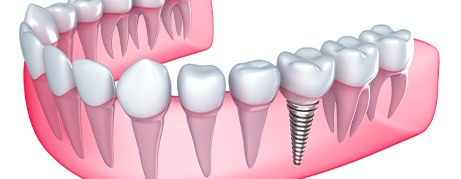
When replacing a single missing tooth, all we need is one dental implant post, metal abutment, and customized dental crown. After placing it in the designated spot, the titanium will fuse with the surrounding tissues to establish a foundation for your new smile. We will then attach the abutment before securing your newly designed crown, which will complete the full root-to-crown tooth replacement.
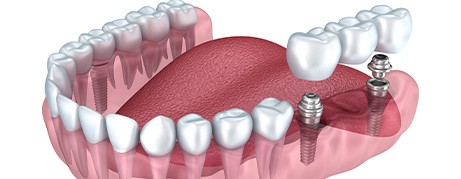
If two or more teeth are missing, we can install an implant bridge that will fill in the gap left behind by multiple missing teeth. By placing two titanium posts in the exterior sockets, we can secure a bridge that will remain firmly in place. Doing so will improve your bite force and prevent slurring while speaking. This new addition will also allow you to keep more of your natural tooth enamel, as no abutment teeth need to be altered with an implant bridge.
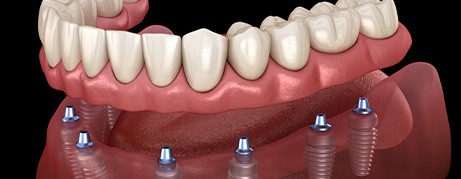
When an entire row of teeth is missing, we can avoid using a traditional denture and instead place between four and six dental implants along the arch. Once fused and fully healed, we will attach a custom-made denture that not only rebuilds the visual appearance of your smile but also provides continuous stimulation to your jawbone so that facial collapse does not occur.

Dental implants can make your grin whole and healthy for a lifetime. That said, they won’t have such effects on their own. Implants need regular care to help your smile. Otherwise, damage and other issues could cause them to fail. It’s thus a good thing you can trust Silfa Dental; we’ve listed some great tips on dental implant care in Commack. By learning them, you can make your new chompers last. Read on to find out more, or book a visit soon!

True, implants don’t get cavities. Their materials are decay-proof due to being artificial. You should still clean the posts daily, though. Your mouth will suffer long-term problems if you don’t.
You see, implants require a healthy mouth to work. Oral issues around them can cause instability. For instance, gum disease could make your gums recede and loosen an implant. It’d then erode the bone tissue that supports your new tooth.
Luckily, good oral hygiene lets you avoid these dilemmas. Just brush twice daily, floss once daily, and rinse with mouthwash. That way, your implants should stay firm.

At their best, implants let you eat as you please. However, they do have limits. It’s best to eat a healthy diet to ensure they last.
You see, unhealthy stuff can have harsh effects on implants. Sticky and sugary items often wedge between the posts. From there, the food debris can decay nearby teeth. You could then develop implant failure as a result.
Of course, a healthy diet protects against these outcomes. Foods rich in calcium, phosphorus, and vitamin C are crucial. By eating them, you’ll avoid gum disease and strengthen your jaw.

Implants are highly durable in the long run. Still, they can’t withstand everything. Avoid or break bad oral habits that can cause implant failure.
In fact, there are several things you should quit. One example is smoking – tobacco delays your recovery and leads to implant failure. Another habit to stop is chewing on hard objects. Whether it’s a fingernail, ice cube, or pencil, biting such items can chip your implants.

Implants are specially designed to withstand your bite. Even so, they can (and will) break if put under enough force. That means you should protect them with good dental tools.
If possible, wear a mouthguard to keep your implants safe. One for sports will defend the replacement teeth from injuries. Meanwhile, using a nightguard overnight will prevent constant tooth grinding.

While you may be cautious, you can’t care for implants alone. There will always be issues that you could overlook or miss. So, make sure to see your dentist often. They’ll monitor your mouth and keep your implants functional.
In particular, get regular checkups – they’re the best form of preventive dental care. These visits would stop implant threats before things worsen. After all, they let your dentist assess your smile and treat minor issues early. The result is a restored smile that stays healthy.

Many factors affect the cost of dental implants in Commack, but we offer flexible financial solutions to keep them affordable. You can invest in the next best thing to your real teeth using a method that may last for a lifetime. We will create the personalized plan you need to replace your missing teeth while staying within your budget.
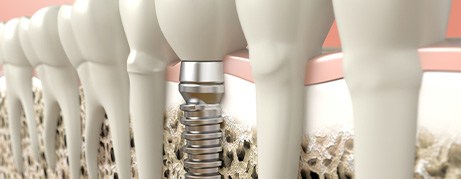
The process of replacing a lost tooth with a dental implant occurs in several steps, each with separate costs. This gives you more time to pay because you won't have to come up with a lump sum. You'll require a consultation with your implant dentist in Commack, which will include diagnostic services and a CT scan. Based on the results of your examination, you may need preliminary procedures before getting dental implants, like tooth extractions, bone grafting, or gum disease therapy.
Once your mouth has healed from any preliminary procedures, you're scheduled for your placement surgery. Sedation or anesthesia will be used to keep you comfortable during the procedure.
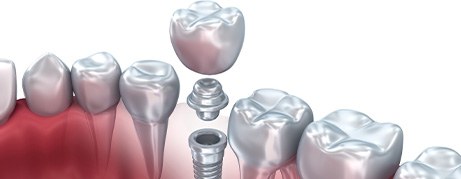
Your estimate will also include each part of your dental implant. Depending on the number of teeth you are missing, you will require a dental implant, an abutment, and a restoration. It's best to focus on quality when choosing materials for dental implants, even if they cost more. Low-quality materials may not be aesthetically pleasing or as durable as those that cost a little more. The saying is true, you will get what you pay for. We will help you choose the best materials for your needs and budget.

Dental implants are the most cost-effective solution for tooth loss because they can last for 30 years or longer with the right care, like brushing or flossing. You won't have to budget for replacements every few years, like when using traditional methods. Not to mention, dental implants preserve your jaw’s density to improve your oral health, so you're less likely to need costly procedures later. As the only treatment to replicate both the tooth root and the crown, dental implants offer priceless benefits because they look and feel natural.

Your dental insurance may cover your consultation and diagnostic services for a co-pay. Your benefits may pay 50% to 80% of the expenses for any medically necessary procedures, such as preliminary treatments or your restoration. We will work on your behalf with your dental insurance to maximize your coverage to lower your out-of-pocket expenses.

In addition to dental insurance, our office offers various financial solutions for dental implants in Commack, including:
There's no age limit for dental implants in Commack, but it's not unusual for older patients to require a little prep work before getting their new teeth. With age come certain medical issues, which require medications to manage, like those used to control high blood pressure. Certain medications and underlying health problems can affect your body's immune system or bone density. You may have a higher risk of infections or delayed healing. You can still benefit from dental implants with pre-existing conditions, but you may require bone grafting, gum disease therapy, or other preliminary procedures before your placement surgery. Your dentist will learn more about your health history during your consultation to create a personalized treatment plan to safely and successively replace your lost teeth.
Your implant dentist in Commack will keep your comfort as their top priority. Sedation or anesthesia will be used to block any pain during your placement surgery. After the effects of any medications wear off, it's normal to have temporary tenderness for a few days. You can manage it by taking an over-the-counter or prescribed pain reliever, as instructed by your implant dentist. Applying a cold compress can reduce pain, inflammation, and bruising. Your dentist will review additional aftercare instructions before you go home, like following a liquid diet for 1 to 2 weeks.
The risk of dental implant failure is less than 5%, but it's best to watch for any signs of a problem. Pain, inflammation, and redness near the implant can be symptoms of an infection called peri-implantitis, which is a leading cause of dental implant failure. It's important to seek dental treatment if you experience any of these symptoms to prevent the infection from worsening. With quick detection and treatment, you can protect your smile from implant failure.
After your jawbone has integrated with your post through a process called osseointegration, it should never feel loose. If your dental implant wiggles, you need to see a dentist right away. It can mean that your implant has failed, but it can also be a symptom of a damaged restoration. Don't take the risk. Contact your dentist immediately for an appointment if your dental implant feels loose. Your dentist will determine what's causing the instability to create a solution to save your smile.